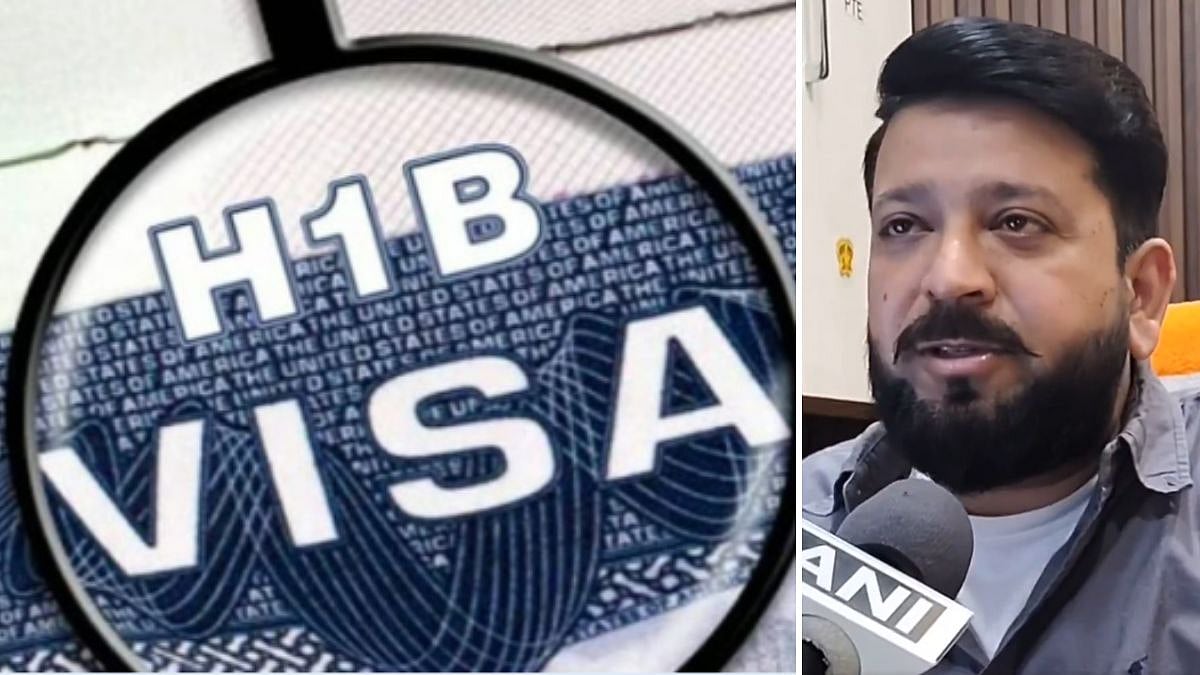'70% Of H-1B Visa Holders Are Indians,' Says Visa Consultant Bikram Chabhal On US Visa Fee Hike
US President Donald Trump's Executive Order raising the fee that companies pay to sponsor H-1B applicants to USD 100,000 has Indian Visa consultants concerned. Bikram Chabhal, president of the Association of Visa and IELTS Centres (AVIC), said the move would hit Indian workers the hardest.

'70% Of H-1B Visa Holders Are Indians,' Says Visa Consultant Bikram Chabhal On US Visa Fee Hike | File Pic & ANI
Amritsar (Punjab): US President Donald Trump's Executive Order raising the fee that companies pay to sponsor H-1B applicants to USD 100,000 has Indian Visa consultants concerned. Bikram Chabhal, president of the Association of Visa and IELTS Centres (AVIC), said the move would hit Indian workers the hardest.
Visa Consultant Bikram Chabhal's Statement
"70% of H-1B visa holders are Indians. After Indians, come Chinese, followed by people from other countries. Previously, the total fee was $215, plus another $750. Now, it translates to eighty-eight lakh plus in Indian rupees," Chabhal said.
He added, "I believe these companies will have to struggle a lot in the future. If a company has to pay a fee of one lakh dollars every year, then companies won't be able to afford that much money." Chabhal stressed that Indians, who make up the largest share of H-1B beneficiaries, stand to lose the most. "The biggest disadvantage of this seems to be for Indians, as Indians used to go extensively on this visa... After receiving those visas, they would then obtain green cards and become American citizens. This will impact them significantly," he noted.
Looking ahead, however, he suggested that the policy shift could indirectly help India. "In the future, this will benefit India more because if specific workers return to India, they will be able to do something good for India. However, America will not find specialised workers in America..." Chabhal said.
Details
His remarks came as US Commerce Secretary Howard Lutnick revealed details of the fee hike during a press call, describing the change as a deliberate strategy to eliminate lower-skilled training positions while preserving opportunities for highly skilled workers.
"A company that wants to buy an H-1B visa... it's USD 100,000 per year," Lutnick explained. The visa maintains its current structure: three years with one possible renewal for a total of six years.
The fee, applicable to all H-1B positions regardless of salary level or skill requirement, is intended to make the programme viable only for roles that justify such a substantial cost. "No longer will you put trainees on an H-1B visa -- it's just not economic anymore. If you're going to train people, you're going to train Americans," Lutnick said.
This change is expected to significantly impact Indian IT services companies like Infosys, TCS, and Wipro, which have historically used H-1B visas to send junior and mid-level engineers to the US. Lutnick, however, argued that the programme will now target only senior-level positions. "If you have a very sophisticated engineer and you want to bring them in because they have expertise, then you can pay USD 100,000 a year for your H-1B visa," he noted.
The secretary claimed technology companies support the overhaul. "They are very happy about it, because they would like a process that is known, that is clear and that is swift," he said, pointing to consultations with "hundreds of companies" that helped shape the policy.
While H-1B visa quotas remain unchanged at 65,000 regular visas plus 20,000 for advanced degree holders, the administration expects fewer applications due to cost barriers. "Remember, these are the same cap, it's the same visa. There'll just be less of them issued because they used to be free, and now they cost USD 100,000," Lutnick said.
ALSO READ
The new fee structure will apply to all applications processed after implementation, including renewals. Enhanced vetting procedures by the Department of Homeland Security will accompany the rollout, which is expected within weeks.
Framing the changes as protecting American workers and boosting US revenue, Lutnick said, "The idea is to bring in high earners, people with money," contrasting this with previous policies that, he claimed, brought in "low earners" who "take jobs from Americans." For Indian professionals and companies, the shift represents a dramatic change. With Indian nationals making up the majority of H-1B visa holders, the fee hike threatens to reshape strategies for US engagement, forcing a move toward higher-value services and reducing reliance on junior-level worker transfers.
(Except for the headline, this article has not been edited by FPJ's editorial team and is auto-generated from an agency feed.)
Published on: Saturday, September 20, 2025, 03:51 PM ISTRECENT STORIES
-
-
-
-
-